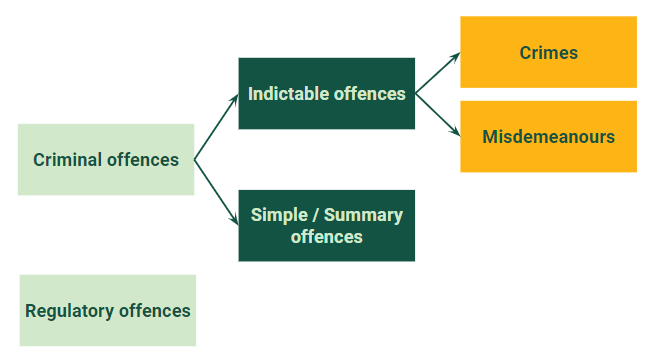Updated August 2019
Reasonable
Lots of legislation uses the terms “reasonable” or “reasonably” as a measure. Broadly speaking this is interpreted as you might expect (what an ordinary person would think “reasonable”) - however it will really be determined on a case by case basis, and ultimately means the police to have a significant amount of discretion.
Summary offence
A minor criminal offence usually dealt with in the Magistrates Court. There is no strict right to have a lawyer present during questioning for a summary offence; however, it is always important to ask to contact a lawyer before participating in any sort of police questioning.
QP9
A document prepared by the arresting officer that outlines the police's version of the offence(s) a person has been charged with. Police Prosecutions can be contacted to get a copy of the QP9 and criminal or traffic history before a court date, but it is usual for the QP9 to be collected at the first mention of the matter in court. If one is not available at your first court mention, you should speak with the duty lawyer.
Mention
The first appearance date in court and future dates set by the court to review a matter. Mentions generally involve a short discussion of a matter in court to determine its progress and what will happen next. The person being charged must attend court for a mention. Failing to appear for court mentions can result in a warrant being issued for arrest and a criminal charge being laid.
Indictable offence
A serious criminal offence. Anyone being questioned about an indictable offence is entitled to have a lawyer present during questioning. Many indictable offences must now be dealt with in the magistrates court, but some have to be heard in higher courts.
Notice to appear
A written document that tells you what you have been charged with and when and where you have to go to court. The police can give you a Notice to appear when they charge you or they can send it to you in the mail.
Bail
A written promise you sign after you have been arrested and charged. The bail document will have conditions and requirements you have to follow. If you are not given bail, you will be kept in custody until your next court mention.
Types of offences
Offences are broken down into a number of different categories. Broadly speaking, there are two types of offences: Simple and Indictable.
Whether you have been charged with a simple or indictable offence will affect a whole range of matters including your right to representation or support during questioning, which court will hear your matter, police powers and responsibilities, relevant legislation, sentencing and more.
You will see in the Criminal Code of Queensland, most offences will state whether they are a crime or misdemeanour.
The Summary Offences Act dictates summary offences in Queensland. Summary/Simple offences are heard in the Magistrates Court. Indictable offences can be heard in the Magistrates Court as well but may be committed to a higher court (District or Supreme).

